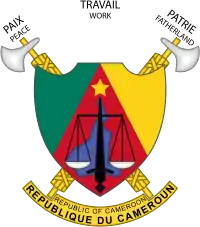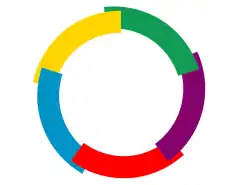Foreign relations of Cameroon
Cameroon's noncontentious, low-profile approach to foreign relations puts it squarely in the middle of other African and developing country states on major issues. It supports the principles of non-interference in the affairs of third world countries and increased assistance to underdeveloped countries. Cameroon is an active participant in the United Nations, where its voting record demonstrates its commitment to causes that include international peacekeeping, the rule of law, environmental protection, and Third World economic development. In the UN and other human rights fora, Cameroon's non-confrontational approach has generally led it to avoid criticizing other countries.
 |
|---|
| This article is part of a series on the politics and government of Cameroon |
|
|
Cameroon enjoys good relations with the United States and other developed countries. Cameroon enjoys generally good relations with its African neighbors. It supports UN peacekeeping activities in Central Africa.
International disputes
Delimitation of international boundaries in the vicinity of Lake Chad, the lack of which led to border incidents in the past, is complete and awaits ratification by Cameroon, Chad, Niger, and Nigeria; dispute with Nigeria over land and maritime boundaries around the Bakasi Peninsula and Lake Chad is currently before the International Court of Justice (ICJ), as is a dispute with Equatorial Guinea over the exclusive maritime economic zone. As of 10 October 2012, it has been resolved that Cameroon own Bakassi.
Cameroon also faces a complaint filed with the African Commission on Human Rights by the Southern Cameroons National Council (SCNC) and the Southern Cameroons Peoples Organisation (SCAPO) against the Government of the Republic of Cameroon, in which the complainants allege that the Republic of Cameroon is illegally occupying the territory of Southern Cameroons. The SCNC and SCAPO ultimately seek the independence of the territory of Southern Cameroons.[1] As of 2008, both parties have submitted briefs and responded to the Human Rights Commissions' inquiries. A ruling by the African Commission on Human Rights is awaited.
Bilateral relationships
| Country | Formal Relations Began | Notes |
|---|---|---|
| 28 May 2007 |
Both countries established diplomatic relations on 28 May 2007. | |
| 24 February 1995[2] | On February 24, 1995, the Republic of Azerbaijan and the Republic of Cameroon signed a protocol on the establishment of diplomatic relations.[2] | |
| 1962 |
Cameroon and Canada have established diplomatic ties since 1962 with three agreements and four protocoles signed in 1965. Both countries share the use of English and French as the two official languages as well as memberships in the Francophonie and The Commonwealth. | |
| See Cameroon–China relations
The People's Republic of China has a number of health and infrastructure projects underway in Cameroon. In January 2007, China signed a series of economic agreements with Cameroon, giving more than $54 million in loans.,[5] China constructed the multipurpose sports complex in Yaounde and renovated the famous Amadou Ahidjo stadium. | ||
|
Cameroon has a dispute with Equatorial Guinea over the exclusive maritime economic zone, which is currently before the ICJ. They also have a dispute over an island at the mouth of the Ntem River. | ||
|
Cameroon has particularly close ties with France, with whom it has numerous military, economic, and cultural agreements, the construction of the Bonaberi bridge in Douala is pioneered by the French and they are to exploit uranium discovered in the Nort by 2018. | ||
| See Cameroon–Georgia relations | ||
| See Cameroon–Israel relations
Cameroon's Rapid Reaction Force is trained and armed by Israel, and Cameroon supports Israel in the United Nations General Assembly (UNGA) draft resolution votes. Many citizens of Cameroon receive training and education in agriculture in Israel. The Israeli ambassador described Cameroon as Israel's best friend in Africa. Additionally, Cameroon strongly opposes the existence of and antagonizes Palestine and is one of only two nations in Africa not to have yet recognized it[6] | ||
| 1975 |
| |
| See Cameroon–Nigeria relations
Cameroon is engaged in a sporadic armed conflict with Nigeria in the oil-rich Bakassi Peninsula. The dispute was resolved through the 2006 Greentree Agreement which led to the full withdrawal of Nigerian troops from the region and its administrative transfer back to Cameroon in August 2013.[9] The two countries agree on maritime delimitation.Economic relations between both states are however timid, the uprise of the Boko Haram terrorists group called for military co-operation between Cameroon and Nigeria. | ||
See Cameroon–Russia relations
| ||
| 10 August 1961 |
Establishment of Diplomatic Relations between the Republic of Korea (South Korea) and Cameroon was on 10 August 1961. In 2012 Bilateral Trade was US$64 million[10] | |
| See Cameroon–Spain relations | ||
| Jan. 1, 1960[11] | ||
See Cameroon–United States relations
|
Multilateral relations
In addition to the United Nations, Cameroon is very active in other multilateral organisations or global institutions such as the Francophonie, The Commonwealth, the Organisation of Islamic Cooperation, the Group of 77, the Non-Aligned Movement, the African Union and the Economic Community of Central African States.
Refugees and internally displaced persons
Refugees (country of origin): 20,000-30,000 (Chad); 3,000 (Nigeria); 24,000 (Central African Republic) (2007)
References
- "Southern Cameroons: The Banjul Communiqué". Unrepresented Nations and Peoples Organization. 23 May 2005. Retrieved 27 April 2009.
- "Cameroon". mfa.gov.az. Retrieved 23 January 2021.
- High Commission of Cameroon in Ottawa
- High Commission of Canada in Yaoundé
- "China, Cameroon Sign Economic Agreements". VOA News. Voice of America. 31 January 2007. Archived from the original on 6 March 2009. Retrieved 25 December 2008.
- "Embassy of Cameroon in the United States". Archived from the original on 1 May 2018. Retrieved 8 December 2018.
- Embassy of Mexico in Nigeria
- "Cameroon; Nigeria: Bakassi Peninsula Transition Completed". Loc.gov. 13 August 2013. Retrieved 27 August 2017.
- Korea, Ministry of Foreign Affairs, Republic of. "Countries and Regions > Middle East and Africa > List of the Countries". Mofa.go.kr. Archived from the original on 4 September 2015. Retrieved 27 August 2017.
- "Turkey celebrates anniversary in Cameeroon". Cameroon Web.
- "Relations between Turkey and Cameroon".
- "Embassy of Cameroon in Washington, D.C." Archived from the original on 1 May 2018. Retrieved 8 December 2018.
- Embassy of the United States in Yaoundé
